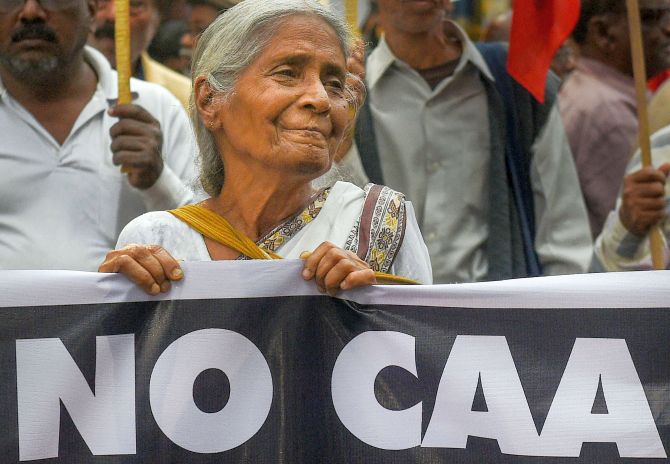The Office of the United Nations High Commissioner for Human Rights has approached the Supreme Court seeking to intervene in the hearing on the Citizenship (Amendment) Act, saying there was a need to take into account the “international human rights law, norms and standards” in the proceedings.
IMAGE: An elderly woman participates in a protest against NRC, CAA in Kolkata. Photograph: Ashok Bhaumik/PTI Photo
The plea, filed on behalf of Michelle Bachelet Jeria, UN high commissioner for human rights, has sought to intervene as an amicus curiae (third party) in the matter by virtue of mandate to protect and promote human rights and to conduct necessary advocacy in that regard.
The Office of the High Commissioner of Human Rights (OHCHR) welcomed the “stated purpose of the CAA” to protect “some persons from persecution on religious grounds”, but raised the issue of exclusion of various sects of persecuted Muslims under the law.
“The CAA can potentially benefit thousands of migrants in an irregular situation, including refugees, who might otherwise face obstacles in obtaining protection from persecution in their countries of origin including through the grant of citizenship. This is a commendable purpose,” the plea said.
It added, however, that there exist “religious minorities in these countries, especially of the Muslim faith, including Ahmadia, Hazara and Shia Muslims whose situations would warrant protection on the same basis as that provided in the preferential treatment proposed by the CAA”.
The apex court had on December 18 last year sought response of the Centre on a batch of petitions challenging the constitutional validity of CAA.
The OHCHR said the CAA raised important issues with respect to international human rights law and its application to migrants, including refugees.
The CAA also raises other issues “including its compatibility in relation to the right to equality before the law and non discrimination on nationality grounds under India’s human rights obligations”, the plea said.
Referring to several international covenants, it said India has “championed the right to equal protection of the law” and the right to equality before the law.
“Without prejudice to the power of States to establish migration policies as a manifestation of their sovereignty, including measures in favour of migrants that may be subject to persecution and other serious human rights violations/ irreparable harm in their countries of origin or previous residence, States must ensure migration governance measures are in accordance with international human rights law, including the right to equality before the law, equal protection of the law …,” it said.
No locus standi: India
The ministry of external affairs has asserted that the Citizenship (Amendment) Act is an internal matter of India and concerns the sovereign right of the Indian Parliament to make laws.
“Our Permanent Mission in Geneva was informed yesterday evening by UN High Commissioner for Human Rights (Michelle Bachelet) that her office had filed an intervention application in the Supreme Court of India in respect to the 2019 Citizenship Amendment Act,” MEA Spokesperson Raveesh Kumar said.
“We strongly believe that no foreign party has any locus standi on issues pertaining to India’s sovereignty,” he said.
India is clear that the CAA is constitutionally valid and complies with all requirements of its constitutional values, Kumar said.
“It is reflective of our long standing national commitment in respect of human rights issues arising from the tragedy of the Partition of India,” he said.
“India is a democratic country governed by the rule of law. We all have utmost respect for and full trust in our independent judiciary. We are confident that our sound and legally sustainable position will be vindicated by the Supreme Court,” he said.
It said the UN body seeks to “assist the court, in examining the compatibility of the CAA with India’s Constitution, in light of India’s obligations under the international human rights law”.
The plea urged the top court to take into account the international human rights law, norms and standards, in the proceedings related to CAA and termed it “important” for India and its diverse communities which have been welcomed by the State.
Referring to the 2011 census, the plea said India has a population of 5.87 million migrants from outside the country out of which over 50 per cent of them came from Afghanistan, Bangladesh and Pakistan.
“Of those migrants, 6,600 were from Afghanistan, 2.3 million were from Bangladesh and 707,000 were from Pakistan. The 2011 census found that out of the 5.87 million migrants from outside the country, 475,910 had arrived in India between five and nine years prior to 2011,” it said.
“It is unclear from these figures, whether the migrants are irregular migrants, or what proportion of the migrants are of a religion not prescribed as benefitting from the provisions in the CAA. There are no reliable figures regarding actual migration to India, particularly in respect of irregular migration,” it said.
The plea said that all migrants regardless of their race, ethnicity, religion, nationality or immigration status enjoy human rights and are entitled to protection.




